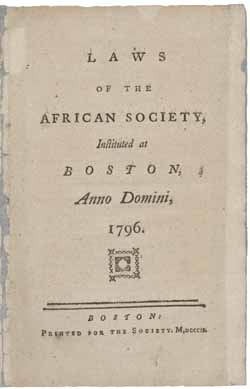Collections Online
Laws of the African Society, Instituted at Boston, Anno Domini 1796
To order an image, navigate to the full
display and click "request this image"
on the blue toolbar.
-
Choose an alternate description of this item written for these projects:
- Main description
[ This description is from the project: Staff Favorites ]
In 1796, 44 African American men living in Boston joined together as the African Society “for the mutual benefit of each other . . . behaving ourselves at the same time as true and faithful Citizens of the Commonwealth in which we live.” The African Society was a mutual aid organization. Members pooled monthly dues and the proceeds from quarterly “charity lectures,” hoping to “acquire a sum suitable to bear interest” in order to pay health benefits to their members and death benefits to their widows and orphans.
In addition to the Laws, the Society published lectures delivered to the members, almost all on the history of enslavement in the Americas or commemorating the official end of the transatlantic trafficking of kidnapped Africans to the United Sates in 1808.
“It’s impossible to separate the study of history from the present.”
MHS Library Assistant LJ Woolcock on the Laws of African Society
The Laws of the African Society is an item that I’m grateful to learn from, and pushes me to think about American history in a deeper way. I was first drawn to the Laws because it speaks to the essential cultural moment that we’re in. Black Lives Matter and the ongoing demands for racial justice have made it clear that the history of Black oppression that built this country is present in our everyday lives. I firmly believe that it’s impossible to separate the study of history from the present. American history has always been an unequal story; that only becomes clearer when you think about this object is housed with the collections of so many colonial, national-era, and 19th-century enslavers. Those enslavers left behind boxes and boxes of papers— meanwhile, we only have the names of the members of the African Society.
The Laws shows us one way that African Americans came together and supported one another. It also reminds us how deeply the United States has failed to live up to its claims to freedom and equality. Like the best historical documents do, it made me ask more questions: who were the people listed on the last page; their wives and children? What was living in Boston like for them? What had they suffered and overcome? And often I feel that it’s asking questions of me: how have things changed? What will you do to make sure our descendants live in a better society than we did?

